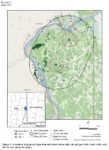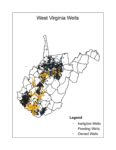|
|||||||||||
CrisisThe DEP Office of Oil and Gas (OOG) has been forced to severely reduce its staff due to budget shortfalls. Currently, OOG only has 9 inspectors overseeing approximately 75,000 wells and 28,000 tanks across the state. That’s 1 inspector for every 8,000 wells. Even when OOG had 1 inspector for every 4,000 wells, scientists found that 53% of a sample of conventional wells in WV were leaking an average of 9 cubic feet of methane per hour. CauseThe problem is OOG is primarily funded through a one-time well work permit fee, though routine oversight and emergency response is needed beyond the initial drilling phase to help prevent environmental harms and threats to public safety. Over reliance on a one-time fee for the only DEP permitting program that gets no federal money, subjects OOG’s budget to dramatic shifts based on number of wells drilled in any given year. Given that Marcellus wells are generally 60 times more productive than conventional wells, it takes fewer wells to produce high volumes of gas than in the past. The funding structure doesn’t provide stability nor nearly enough resources for adequate oversight of the range of activities involved in oil and gas development. SolutionsAnnual fee per well. SB 480 and HB 2725 provide for an annual fee per well. Every other regulated industry has to pay an annual permit fee. Under SB 480, only wells producing 10MCF/day of gas or greater would have to pay an annual $100 fee. SB 480 would only get OOG back to 1 inspector for 4,000 wells. Under HB 2725, all wells would pay an annual fee of $100 resulting in approximately $6.5M for OOG annually. Wells that cannot afford pay $100/year are already dangerously marginal, and should be plugged before the state is further burdened with more abandoned unplugged wells. Such fees could be tiered where higher producing wells pay more according to a sliding scale, resulting in more stable revenue for OOG. Percentage of severance tax dedicated to OOG. SB 613 dedicates 1.5% of oil and gas severance tax to the OOG. SB 613 would result in an approximate average of $3M for OOG annually, though it can fluctuate dramatically. This approach requires redirecting existing revenue meeting other needs of the state to OOG. Bottom LineOOG needs more resources to properly manage its oil and gas program. The current revenue structure is collapsing. We believe OOG needs stable revenue that supports at least 1 inspector for every 2,000 wells; this would require around $3M in additional annual revenue. We support the oil and gas industry paying their fair share to do business in our state, as other industries do, and thus support the annual fee approach. Action NeededContact the members of the Senate Energy Industry and Mining Commitee and your legislators and urge them to support these needed solutions to the OOG funding and staffing crisis. |
|||||||||||
WV Surface Owners' Rights Organization © 2016
Frontier Theme









